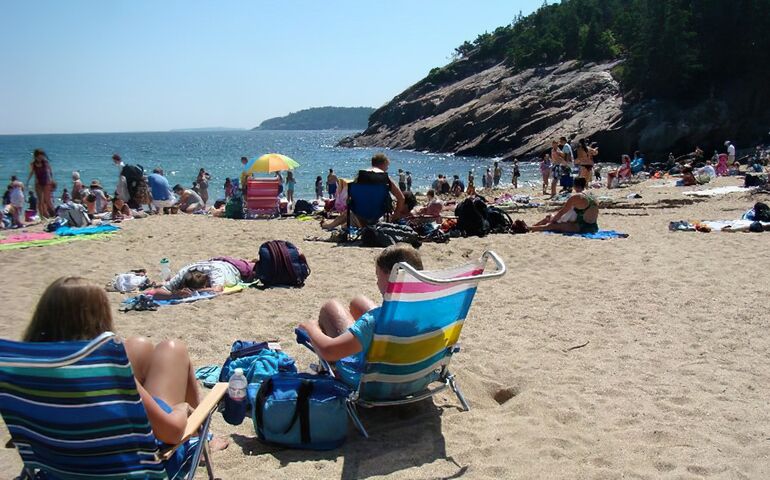The Great American Outdoors Act, a bill cosponsored by Maine’s U.S. senators and considered by advocates among the most important conservation laws in decades, was passed by the Senate Wednesday.
The act includes $9.5 billion over five years for to help take care of the $12 billion backlog at national parks — including $65 million at Maine’s Acadia National Park — and other federal land maintenance and also fully fund the Land and Water Conservation Fund, which is responsible for $18.4 billion in land acquisition and facility construction over the past five decades.
Together, the two pieces of the act are expected to generate hundreds of thousands of jobs and support a variety of outdoor recreation businesses and communities. The act funnels billions of dollars into preserving and maintaining recreational land, creating a powerful economic generator for the outdoor recreation industry and potentially restoring jobs lost in the COVID-19 crisis.
U.S. Sen. Angus King, I-Maine, the ranking member on the Senate Parks Subcommittee, called the act “monumental legislation that will preserve these lands for future Americans.” He and U.S. Sen. Susan Collins, R-Maine, are cosponsors.
The Restore Our Parks Act, the maintenance funding part of the legislation, will support an average of 40,300 direct jobs and 100,100 direct and indirect jobs over the next five years, King said, citing a National Park Service study.
Collins said the legislation builds on last year’s reauthorization of the Land and Water Conservation Fund, which is “our country’s most successful conservation and outdoor recreation program.”
“Its funding has been used to open up key areas for hunting, fishing and recreational access; support working forests and ranches; protect critical lands in national parks, national wildlife refuges and national forests; and to support state and local projects, from ball parks to recreation trails,” she said.
The legislative package was approved 75-25 by the Senate, and still must be approved by the House of Representatives.
Specifically, the Great American Outdoor Act includes the following.
Restore Our Parks Act
The $9.5 billion Restore Our Parks Act, cosponsored by King, addresses a $20 million federal recreation land maintenance backlog. The $12 billion national park backlog, including $65 million at Maine’s Acadia National Park, would get 70% of the money; the U.S. Forest Service would get 15%; the U.S. Fish and Wildlife Service, Bureau of Land Management and Bureau of Indian Education would split 5%.
King introduced the Restore Our Parks Act in July 2018 with U.S. Sens. Lamar Alexander, R-Tenn.; Rob Portman, R-Ohio; and Mark Warner, D-Va. The legislation will establish the National Park Service Legacy Restoration Fund to reduce the maintenance backlog by allocating revenues the government collects from on and offshore energy development.
Land Water and Conservation Act funding
The LWCF, which is responsible for $18.4 billion in land acquisitions and facilities construction since it was established in 1965, is allotted $900 million a year, also paid for with revenues from oil and gas exploration and drilling fees, but is usually funded an average of $450 million. The legislation would ensure it’s fully funded every year without having to go through the legislative process.
The fund “has been essential to land protection efforts at Acadia and in communities throughout Maine,” said David MacDonald, president and CEO of Friends of Acadia. According to proponents, it has supported projects, from national parks to ball fields, in every county in the U.S.
Over the last five decades, Maine has received more than $191 million in funding from LWCF, with 850 sites, 650 of which are community-based projects, according to Collins’ office.
The legislation passed by the Senate Wednesday builds on the John D. Dingell, Jr. Conservation, Management, and Recreation Act, signed into law last year, which permanently authorizes the LWCF. That act created six new national park service units and conserved 1.3 million acres.
A job, economic generator
Nationally, outdoor recreation contributes $778 billion in consumer spending and supports 5.2 million jobs. National parks alone generate $41 billion in economic activity, according to a 2018 study.
Locally, Acadia National Park and the Katahdin Woods and Waters National Monument will both benefit from the additional funding.
“Acadia and all who enjoy it will benefit greatly from this historic legislation,” said MacDonald, of Friends of Acadia. “Passage of the Great American Outdoors Act in the Senate is a major step toward preserving and protecting the places that mean so much to us as a nation.”
He said the act would “dramatically boost funding available for maintenance of existing assets in parks, such as trails, roads, bridges and water systems.”
Andrew Bossie, executive director of Friends of Katahdin Woods and Waters, said, “Katahdin region communities are eager to see the economic benefit from our new national monument and this bill will help ensure that infrastructure is maintained so visitors to Katahdin Woods and Waters have a safe, enjoyable experience and spread the word about the beauty to behold beyond the park gates, now and in the future.”
